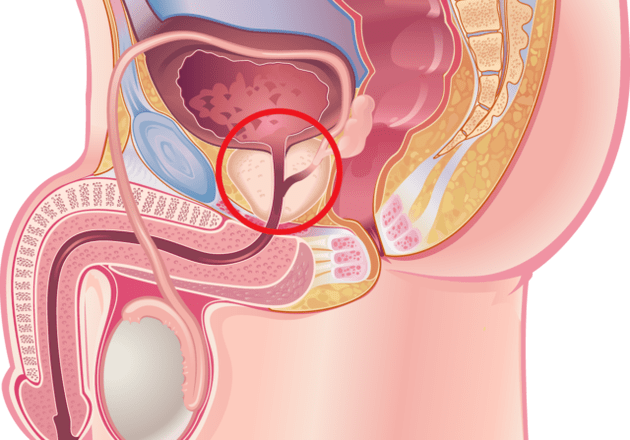Inflammation of the prostate gland or prostatitis is highlighted by a few numbers on the ICD list. It all depends on the form of the pathology and the nature of its origin.
What is an ICD
There is a regulatory document used in the medical community, which is periodically reviewed by the World Health Organization. Contains a list of all diseases and pathologies that occur in humans. It is called the International Classification of Diseases (ICD). Its main purpose is to help study the patient's condition and create optimal conditions for this by systematically recording the available information. Information is collected from all over the world and coded under certain symbols. It can be added and obtained for additional research at any time.
It is important! The ICD table contains coded classes and groups. A title can contain several forms and manifestations of the same disease. The entrance is arranged in alphabetical order for convenience.

Diseases of the prostate gland according to ICD-10
The list of diseases includes:
- acute prostatitis ICD 10 41. 0;
- chronic prostatitis ICD 10 41. 1;
- prostate abscess - 41. 2;
- prostatocystitis - 41. 3;
- other inflammatory conditions of the prostate - 41. 8;
- Undiagnosed inflammatory disease of the gland - 41. 9.
An ordinary person does not need to know ICD coding. Only a doctor can decipher and encrypt the diagnosis.
Prostatitis according to ICD-10
Prostatitis code according to ICD 10-41. If benign hyperplasia develops in the body, the disease is determined by another number. In adults, adenoma of the prostate gland according to ICD 10 is marked with numbers from 40 to 51. These headings include various fibroids and fibroids.
It is one of the most common urological diseases affecting men of all ages. In general, the inflammatory process in the glandular tissues is most often observed in a chronic form without the initial acute symptoms.
Experts classify the disease according to the nature of the course:
- acute, occurs in 50% of patients not older than 30-35 years. It is mainly associated with bacterial infections;
- chronic It does not manifest itself for a long time and can develop against the background of an infectious process.
Occurs due to:
- bacteria that form inside the body;
- non-bacterial, in which pathological changes occur mainly in a chronic form;
- viral affecting the entire genital area.
Due to the nature of structural changes, they differ:
- fibrous form. Glandular tissue grows very quickly and needs radical treatment. Clinically similar to the ICD of a prostate adenoma of 40. 0;
- calculation. Glandular occurs when stones form in the tissues of the body. It is considered a harbinger of cancer;
- stagnant form. Physical inactivity occurs with prolonged abstinence from sexual intercourse.
Causes and symptoms
Both chronic and acute glandular pathology are directly related to improper lifestyle, smoking and alcohol dependence, and poor physical activity.
The main reasons for the development of the disease in young men are:
- Sexually transmitted infections: gonococci, Escherichia coli, chlamydia, etc. Frequent change of sexual partners increases the risk of developing the disease;
- obstruction in the pelvic organs associated with circulatory disorders;
- sedentary, sedentary lifestyle, physical inactivity;
- prolonged abstinence from sexual intercourse, abuse of drugs that prolong sexual intercourse, deliberate delay in ejaculation during intercourse to prolong it;
- reduction of immunity;
- psycho-emotional stress, severe stress;
- excessive physical work;
- hypothermia;
- endocrine system failures;
- unbalanced diet;
- dependencies.
The symptoms of acute and chronic inflammation in the prostate are similar. The doctor will help to identify the form of the disease after examination and diagnosis.
Features
The acute form is accompanied by severe clinical symptoms, and all the tissues of the glandular organ are involved in the pathological process. Therefore, the disease is painful and difficult: general signs of intoxication with an increase in body temperature.
The patient complains:
- heaviness and pain in the groin, pelvic region, lumbar region;
- feeling of tightness of the rectum;
- increased urge to urinate, including at night;
- pain in the urethra after emptying and emptying the bladder.
In the chronic form of lower abdominal disease, some men experience pain of varying intensity, erection, and potential problems. In 95% of cases, the disease is practically asymptomatic.

ICD codes for acute and chronic prostatitis
Chronic prostatitis ICD code 41. 1 can be exacerbated by any adverse factor. Acute inflammation of ICD 41. 0 causes edema of the glandular tissues, which is fraught with acute urinary retention.
In the absence of appropriate treatment, such diseases cause serious complications:
- bladder obstruction;
- development of human infertility;
- narrowing and scarring of the urethral canal;
- recurrent cystitis;
- pyelonephritis and other diseases affecting the kidneys;
- purulent glandular tissue requiring immediate medical attention;
- sepsis, which develops in people with the weakest immunity.
Diagnosis of pathology
In some cases, a single rectal examination and examination of the patient's complaints are sufficient to make a diagnosis. However, inflammation is mainly diagnosed by laboratory and instrumental methods.
The patient is referred to:
- blood and urine tests to detect infections and inflammation;
- analysis of prostate secretions;
- ultrasound examination of the prostate, kidneys, bladder;
- urethrocytoscopy;
- MRI of the pelvic organs;
- PSA blood tests;
- biopsy;
- x-ray.
One of the most effective diagnostic methods is a digital rectal examination of the prostate. Despite its acute form, the body is very sensitive and the procedure can cause severe pain to the patient.
Treatment tactics
The ICD code requires comprehensive treatment of chronic prostatitis, which is included in the International Register of Diseases. The patient is advised to adjust his diet, change his lifestyle, give up harmful addictions and start eating properly.
Also appointed:
- Medication. Helps relieve pain, eliminate inflammation, activate the regeneration of damaged cells of the glandular organ. Mainly suppositories and antibiotics are used.
- Prostate massage. It is considered to be the most effective way to get rid of stagnant processes in the situation. It is carried out independently or with the help of a specialist. The procedure is considered unpleasant, but must be performed.
- Balneotherapy. With the help of mineral water in sanatoriums, men cope with the chronic form. It is useful to drink both healing water and take a bath.
- Physiotherapy. Thermal physiotherapy gives excellent results. Helps to absorb drugs quickly, relieve general symptoms and increase blood circulation in the problem organ.
- Diet is an important step in treatment. A healthy diet should include vitamins, fiber, amino acids and mineral compounds. You will have to avoid unnecessary foods (pickles, marinades, smoked meats, fried, fatty foods). The list of desirable products includes sour milk drinks, lean meat and fish, nuts, dried fruits, pumpkin seeds.
When other treatments do not work or purulent processes begin, surgery is rarely used for chronic inflammation.
Requires the use of acute medications, microclysters, rectal suppositories, analgesics, analgesics. The patient is given bed rest and refusal of intimacy. Prostate massage and physiotherapy are prescribed as soon as the acute period passes. It is very important to choose the right medication for this type of disease. This is possible only after a proper diagnosis. The expert says what types of drugs and in what dose will be prescribed.
Prophylaxis
In order to prevent the development and deterioration of prostatitis in adults, the ICD code is given in 10 41, you must follow the following rules:
- lead an active and healthy lifestyle. If it is not possible to visit the gym, you need to exercise in the morning, warm up during the working day and walk more. A kind of gym will serve as a staircase that a person climbs into his apartment every day;
- Avoid hypothermia: do not sit on a cold surface, wear for air, etc. ;
- with constipation, include foods that enter the intestines in the diet, take mild laxatives. If the disease is persistent, it is advisable to consult a specialist;
- regulate sex life. Prolonged abstinence from sex is the first step in the development of glandular diseases. If you do not have a regular sexual partner, you can temporarily replace it with masturbation, but you should not interfere in this activity;
- Avoid unprotected sex without contraception. Sexually transmitted diseases are indistinguishable at first, but cause a form of infectious prostatitis by causing serious damage to the glandular tissue;
- If you have the slightest suspicion of a sexually transmitted infection, you should consult a venereologist or urologist. It is enough to undergo an examination to find out the cause of the appearance of unpleasant symptoms;
- It is necessary to visit a urologist at least once a year to rule out the possibility of the onset of the disease.
Reviews
- "The international classification is no less important in the treatment of prostatitis of any etiology, because the ICD 10 code allows you to accurately determine the type of disease, make a diagnosis and implement effective therapeutic measures. "
- "My father had a prostate adenoma. The ICD code was deciphered by a doctor when he was diagnosed. The stage is very neglected, the diaper has almost tripled. The operation was planned and completed successfully. Age (over 60) and other chronic diseases manifest themselves. Recovery was delayed because he felt. Now he has no complaints from the genitourinary system. "
- "Chr. I have prostatitis ICD 41. 1 on my card. I have been suffering from this disease for a long time, but very rarely it gets worse, because I do everything to avoid the appearance of acute symptoms. That's why I do sports - I run every morning, I exercise, I don't drink alcohol, I don't smoke. "
























